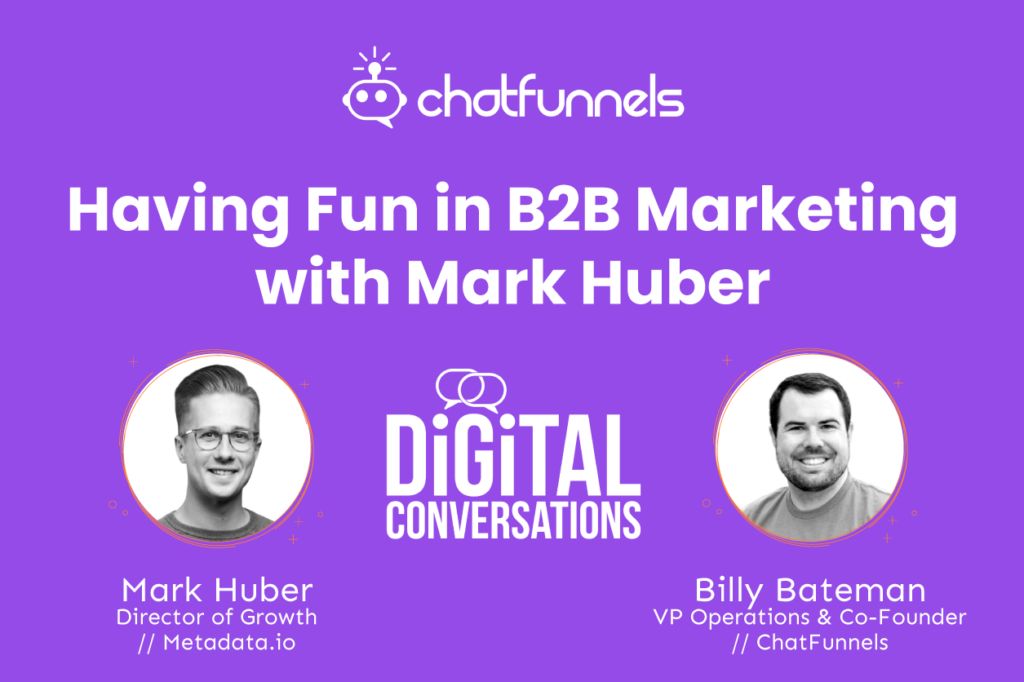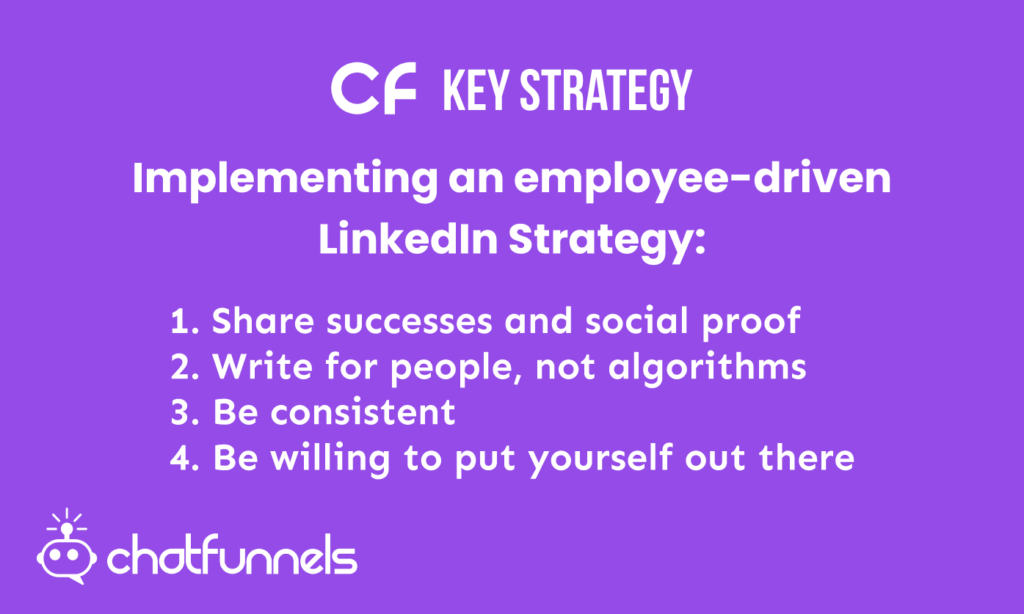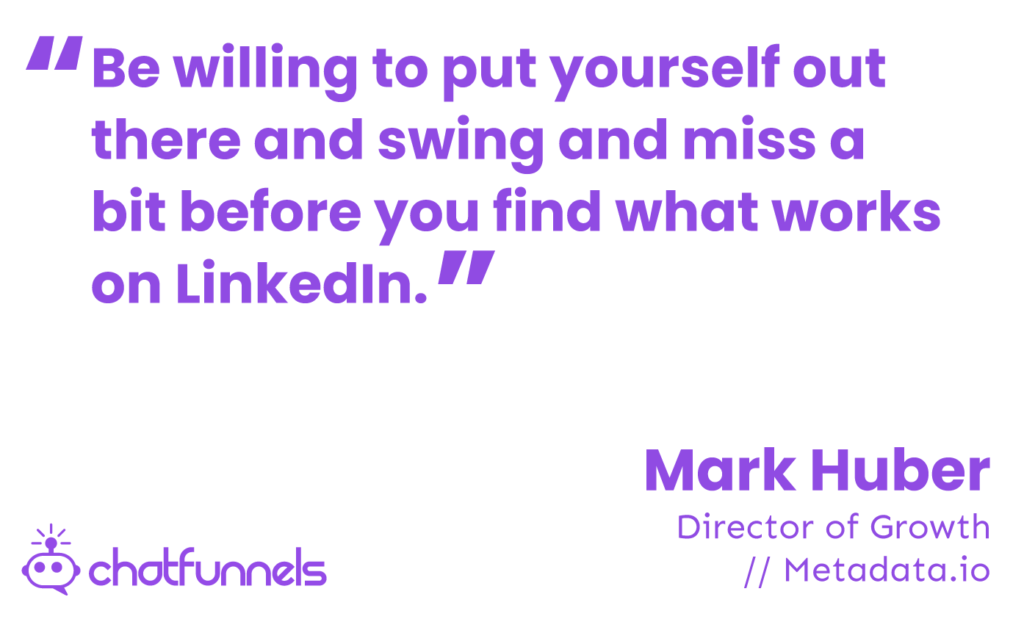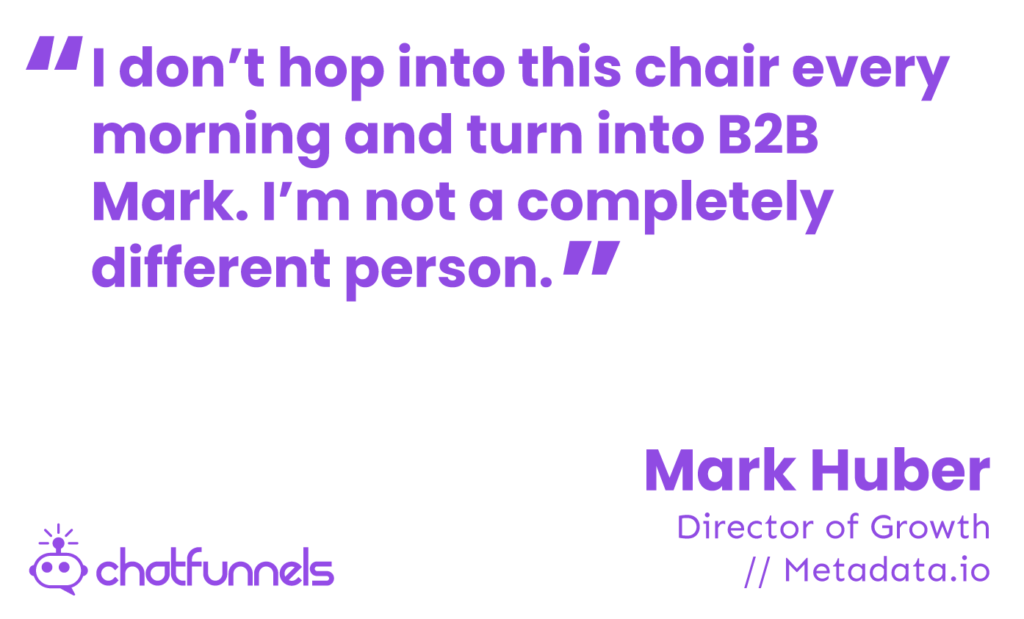Having Fun in B2B Marketing with Mark Huber

Overview
Mark believes in a fun B2B marketing strategy where the people at your company post on LinkedIn in a fun, organic way. He outlines his tips for social media success.
Guest
Mark Huber is Director of Growth at Metadata.io. He’s on the hook for making sure every B2B marketer who is held accountable to pipeline and revenue contribution knows about Metadata.
Reference
Welcome
Billy Bateman 0:01
All right, everyone. Welcome to the show today. I am your host, Billy Bateman. And this is digital conversations presented by ChatFunnels. Today I am joined by the great Mark Huber, how you doing Mark?
Mark Huber 0:14
I’d say a pretty big intro. So hopefully I don’t disappoint. But I’m doing well. Thanks for having me, Billy. I’m excited.

Billy Bateman 0:19
Yeah, I’m excited to have this, this conversation we’re going to, if anyone hasn’t been following mark, and what he does its metadata and their social presence. It’s a fun follow, we’re going to talk a lot about kind of his philosophy and what they’re doing to put the fun back in b2b marketing. But before we dive into that, for people that don’t know you, would you mind just telling us a little bit about yourself and your journey to how you got to where you are today?
Mark Huber 0:47
Yep. So, I grew up just outside of Chicago, in Park Ridge. So, for those that have frequented O’Hare International Airport, it’s pretty close to O’Hare, I grew up as a son of a third-generation family business that I clearly don’t work out today, because I’m talking to you on a podcast.
But I think a lot of what I learned growing up in that family woodworking business is something that I still kind of take with me today. And I think a whole lot of good comes out of that. So, I’m the least handy person that you’ve probably ever met. So, I was worried when I had to break the news to my dad, when I graduated from Indiana University, that I was not, you know, interested in in taking, you know, a role in the family business.
And it was one of those things where I was, you know, nervous to kind of, you know, break the news to your dad, here it is. And he goes, Mark, I’ve known since you were five years old that you know, you didn’t have a handy bone in your body. So, it’s, it’s funny how that all worked out.
But no, I think from a young kid, I kind of weirdly had an interest in marketing. And I think more on I would say, the branding side, if you will. So, whether it be you know, playing literally baseball, or travel hockey, like I always wanted to look like a pro, and was always paying attention to how they looked how they carried themselves, what they did their routines, like you name it.
And I think that kind of image and being that image conscious, that was something that led me to just having an interest in marketing in general, really the brand management side of things. Once I got to college, I realized that one, they don’t hire very many, if any brand managers right out of school, and you don’t make very much money doing that. So, I knew I wanted to say into marketing, but I got into the consulting side doing digital marketing first.
Billy Bateman 2:41
Awesome, awesome. And then you are the director of growth, that Metadata.IO. Tell us a little bit about Metadata and what you guys do over there.
Unknown Speaker 2:50
Yep. So, I’m a big fan of the term pitch slap. So, I will not pitch slap anybody on here. But basically, what Metadata does is it’s a new demand generation platform. So, we typically come up against ABM platforms, but we don’t believe that ABM is a thing. And marketers use metadata to run campaign experiments at scale and figure out not just what drives engagement, but what drives pipeline and revenue. And the beauty is you can do that all from a single tool instead of having to log into multiple windows, whether it’s Facebook, or LinkedIn, or whatever display tool you’re using, and be able to report out on all of your impact, all from that same tool. Awesome. Awesome. I
Billy Bateman 3:33
love it, man. I love it. And so, let’s just hop into what we’re going to talk about. So, when we talked about, you know, doing a podcast a few weeks ago, one of the things that really stood out is like you guys have a lot of fun with your marketing.
Like if you guys follow like, if you’re not following Mark, or metadata like you should. It’s just like different. It’s a little more playful, and wanted to talk to you about like, how do you have fun with b2b marketing while still being effective? And you know, professional in that. So, like, I’ll let you just get started, like, what’s your philosophy on how you do that?

Mark Huber 4:12
Yep. So, the first thing that I’ll say is, you know, we are not the first company to do this, or take this approach by any means, I think the early days of drip when did Gearheart was there, in addition to what Gong is doing now and even, you know, agencies like refine labs.
But really the difference is social from b2b companies, historically has been so boring, and it just comes from the company accounts. It’s very self-promotional. It’s, you know, look at me, look at us, look how great we’re doing. And no one really cares about that and what the Gongs and the rest of the world kind of pioneered and we’re, it’s a taking and putting our own spin on it is people want to do business in the b2b world with other people.
So, we are looking at Organic social on LinkedIn from our own employee counts as really the new way of doing social for b2b companies. So, you know, we’ve got our own company LinkedIn accounts, or sorry, LinkedIn and Facebook accounts that we run.
And, you know, we still try to have fun with. But more importantly, we’re looking and encouraging all of our employees to find their own kind of personal voice, if you will, and brand. So, they are really the voice of metadata. And it’s great because it comes from the top down, which, for this to work really well, you have to have that buy in. And I think the other thing is for people that, you know, may not be comfortable doing with it. I wasn’t doing this before I got the metadata, and I’ve been doing it for close to a year now.
And, you know, it’s, I’d say painful and might feel awkward at first, you know, putting yourself out there, but through your posting, you know, regularly. And when you have something to say, and not just for the sake of gaming the algorithm, you start to find not only what works, but like what you like, and I think what other people like as well.
So, for us, you know, are there, you know, serious updates? Or are there things or we’re trying to share? You know, what we know, of course there are but is that the only thing that we’re posting, absolutely not like we don’t take ourselves too seriously.
That’s something that we pride ourselves on. And we really want there to be some entertainment value in everything that we post and everything that we do. So, for me to say that, you know, I’m a completely different person, when I, you know, hop into this chair every morning, and you know, I turn into b2b Mark, like, that’s not how this works. I still find the same things just as funny, whether it’s a meme, whether it’s a joke, whether it’s a gift.
And it’s not to say that those are the only things that you should be posting on social, but you got to have some fun with it. And I think the last thing I’ll say for now is, it’s hard to always quantify. So, we don’t go into this thinking that we need to quantify everything. But you really would be surprised how often this comes up from prospects and even our customers on our call recording. So, people are noticing it, you know, whether they’re engaging with your posts or not.
Billy Bateman 7:03
Yeah, yeah, no, I mean, we noticed over here, what you guys were doing. So let me ask you this, like, you know, you’re getting the whole team to do this. It’s not, you know, like one person says, hey, you know, you should share this and gives it to the whole team. How did you get everybody started? Like, what? What was the genesis? And how’d you get the ball rolling? Because, you know, I’ve heard people, a lot of people talk about this, we want to be the voice. Yep. doesn’t always happen, like you guys have been able to make it happen. So yep. How did you make it happen?
Mark Huber 7:35
Yeah, so I think a couple things. I think it definitely takes, you know, a few, let’s say, maybe two or three people to get it started. And once you have, you know, I’d say that small group, then you can start to share, you know, positive signs that, hey, this is maybe getting some traction, that could be taken screenshots, and sharing them on slack with the rest of the company. It could be, you know, just monitoring that on call recordings. But I think, to really get traction with it,
Billy Bateman 8:03
you have to
Mark Huber 8:04
share the successes, just so that people know that this is working, I think the other thing that you really have to do is you have to provide people with content to share. But like you mentioned earlier, we don’t require our employees to share every single piece of content that we’re putting out there.
So based on the kind of personal brands that some of our employees have, they’ll pick and choose the metadata specific content that they want to share, because we don’t want them to only share metadata content. This isn’t just some one-way channel.
And then I think the third thing, and I briefly mentioned it earlier, it really, really helped that our CEO and President get this and think that it’s important, not just personally but they know that our audience is there as well. So, when it comes from the top down, and they say Hey, guys, this is working. you know, they’re not going to require it in your job.
But when you’ve got that buy in from the top, it does make it that much easier. For those that don’t have that buy in just yet. You know, just check out what Dave your heart’s doing. Check out what Chris Walker is doing. I know Dave Gearhart is coming out with a book. I think it’s called founder’s brand, or something like that in the fall.
And really what it comes down to is the more that you can show the people behind the company and the product and the software or whatever it may be that you’re selling. That’s what people are interested in. They want to see you know, who makes the company and there’s no easier way to do it than being active on social
Billy Bateman 9:32
Awesome, man. I agree. Like there’s an easy way to share it. I my brother loves barstool sports. Yep. So, I mean, I’m not as into it, but man what those guys do. They just create like fun, viral content. It’s not b2b at all. But, man, they will bring you behind the scenes. I remember l pres used to do the water cooler. Oh god. Yeah. I’m actually going to get out So, I don’t know,
Mark Huber 10:02
I think it never was. Well, no, I think to that point, though, and it doesn’t have to be barstool but one of the things that like I do is I love, you know, meme accounts on Instagram. And I’m trying to see whether it’s memes or whether it’s other things that are working for b2c companies. Like, there’s your inspiration, you don’t have to copy it verbatim. And it’s not what you know, I think you should do, but you can find inspiration. And that’s what we do not just in our social, but I would say in a lot of our marketing from b2c companies, and then use that in b2b like, that’s the secret sauce.
Billy Bateman 10:32
I think it is, I think it is when I worked in inside sales. Ken Crowe, one of the co-founders was running marketing. And he would sit us down every couple month and have like, I always just, we’d have a name for it. But I was like, this is the BDC, like, cheap book or whatever, where he would look at different websites or different tactics that b2c companies were doing. And he was like, we got to figure out how we replicate this for b2b because they’re always ahead of us beat us. He’s always ahead of us with marketing. So yep. Yeah, man, I love it.
So let me ask you another question. So, you got to ruin started, you got to have some support help with content that makes sense. You know, how, how do you keep it going, though? Because there’s, you know, there’s a lot of things. We start in businesses where I kept, we’re going to be doing this in Alaska for three months, and then a dime.

Mark Huber 11:22
Yes. Yep. Yeah. So, I would say, this is one of those things that we make a priority for us, even in times where, you know, you may feel swamped, and you might not be able to get around to it. And I think by sticking to that level of consistency, that allows us to continue to push out things when we think we need to post now I say that, because I think there’s a huge difference.
There are quite a few people out there, and I was even posted about it today. There’s posting, you know, for the algorithm, and there’s posting kind of for you and your audience. And we are definitely not a game, the algorithm type company. And I hate when I see people do that. So, what we do is, you know, we try to post, you know, a handful times a week, sometimes there are, you know, weeks where I might be too busy.
And I might not get to, you know, anything. If I can’t come up with an original post, what I’ll do is I’ll oftentimes just comment on other people’s posts. And I think what you can then do by taking that approach is, you can start to see what comments are getting people excited, and then based on that, you can turn those into longer form posts.
So, I think it comes down to consistency. And then I think also, it comes down to just sharing successes. So, we’ve got, you know, a couple different slack channels in the company. slack is a big part of our culture, good or bad. But I think one of the best things about it is we’ve created a culture where people continue to share, not just posts from our own employees that could good traction, but also posts, you know, that our customers or prospects, or competitors are posting just to see what’s out there. So, we do stay on top of it. And you got to commit to it. That’s the most difficult part.
Billy Bateman 13:10
Yeah, I agree. Okay, man. So, another question is, you know, for somebody who hasn’t been that active on social, you know, like, a lot of people, I think, just, you know, like they get on LinkedIn, they look at what’s going on, they may like a few posts, but that’s about it. You know? How do you find your voice? As you’re getting started? What are your tips?
Unknown Speaker 13:31
Yeah, so that’s, that’s a good question. So, I think a couple different things, I’d say to start. So, the most difficult part is the writing. And I would say the, and it’s not just me, but anyone who does this, well will probably tell you the same thing is you need to write, and you need to write consistently.
Unknown Speaker 13:53
So, the first few times, you know, when I started to post and now after this recording, I kind of want to go back and look what I posted. But I felt like I was trying so hard to like perfect this and make sure that the writing was perfect, and the grammar was perfect. And everything and all of those posts probably tanked. You know, maybe they got a handful likes.
Mark Huber 14:13
And I was thinking wow, like, is this really worth it. But for me, you have to be willing to put yourself out there you have to be willing to, I wouldn’t say fail, but just maybe swing and miss a bit before you find what works. And I think you find what works in a few different ways. One by consistently writing because the writing becomes that much easier. Now there are times where I, you know, come up with something and I write it in a couple minutes. And it does really well. versus some of those initial posts where I was spending, you know, 45 minutes to an hour trying to perfect this and sharing as much as I possibly could, and it just bombed. So, you have to be willing to kind of, I’d say, try different types of posts.
I know, you know, on Fridays, there are, you know, posts that I try to have a little bit more fun with and maybe in the beginning of the week There are times where I’m posting just about metadata, and not in a kind of a chest pumping kind of way, but more metadata specific content.
And then there’s other days, you know, where I’m posting just general thoughts I have about the space. I think the other thing is, before people start to worry, you know, in my old self included about coming up with original content is, you can start to just comment on people’s posts and get started that way.
Then as you get more comfortable, then you can turn, you know, some of those comments that you had into your own posts, in addition to just following probably a few people that you like, so, you know, there, I would say, you know, somewhere in the range of maybe 10 to 15 people that I would say, are people who I admire and just terms of their own personal brands. and what they’re posting and not taking themselves too seriously. I kind of, you know, pick and choose things that I see they’re doing that I enjoyed, and really just put my own spin on it. It doesn’t need to be 100% original every time.
Billy Bateman 16:01
Yeah. Okay, man, dude, this is this is good. So, is there anything like up to this point that you’re like, man, Billy should ask me about this that I haven’t asked yet. Um, I think
Mark Huber 16:17
probably, you know, how often do I need to be posting or like, what are the best practices? And like,
Billy Bateman 16:23
how often do you post? Do you an everyday guy? Are you a couple times? And
Mark Huber 16:27
I think it’s like a natural question to ask. But if you’re just doing best practices, like, are they really best practices at the end of the day? So, like, I find things you know, maybe as a starting point, and then I’ll post to see if it works and whatnot, but like, I’m not following them to a tee.
Nor do I think, you know, you should, I think you kind of have to use those maybe as a starting point, and then see what works for you. Because if you’re following the same playbook as everybody else, you know, you’re probably too late. In following that playbook.
Billy Bateman 16:59
I agree, man, once everyone, everyone’s like, this is the playbook. I mean, there’s some truth to it. And yeah, if you’re doing it exactly, you’re just like everybody else, you know? Yep. So Well, Mark, dude, this has been awesome. I appreciate you sharing your insights.
Before I let you go, I get two more questions. The first one, what’s your just one tip for anybody, whether they’re just like, trying to implement this on the company level, or maybe even just somebody on the marketing team that’s just like, I’m just going to start doing this myself? What would be your one tip to anybody getting started?
Mark Huber 17:35
social proof. And I think social proof works for just about anything, but I go find some companies who you think are doing this really well take screenshots of those and show it to your boss or your boss’s boss. It’s so much easier when you’ve got examples. And you can show Hey, this, this stuff works.
Billy Bateman 17:50
I like it. I like it. And then the last one, if anyone wants to continue the conversation with you, how do they reach out?
Mark Huber 17:57
Yeah, feel free to connect with me on LinkedIn. Always happy to meet with other marketers and hopefully get a few laughs over the course of their workweek for them. So
Billy Bateman 18:07
happy to help. Okay, Mark, we’ll chat later, man. Thanks, Billy. appreciate you having me on. Yeah. Thank you.
